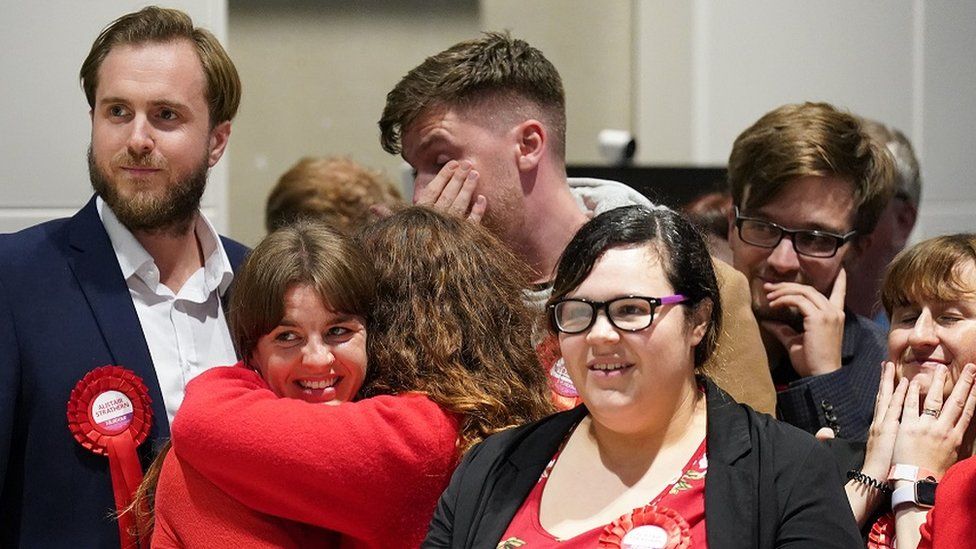ARTICLE AD BOX
 Image source, PA Media
Image source, PA Media
By Sir John Curtice
Professor of Politics at Strathclyde University
The results from Tamworth and Mid-Bedfordshire represent one of the worst by-election nights that any government has had to endure.
In Tamworth, the 23.9% swing from Conservative to Labour was the second highest such swing in post-war by-election history. No government has previously lost so safe a seat - the Conservatives had a 42% majority in 2019 - to the principal opposition party in a by-election contest.
In Mid-Bedfordshire the swing was a little lower, 20.5%. However, the Conservatives' own share of the vote fell by even more than in Tamworth. Indeed, the 28.7 point drop in Mid-Bedfordshire was the sixth biggest fall in Tory support in the post-war period.
The swing to Labour was lower than in Tamworth because the spoils of the swing against the government were shared between Labour and the Liberal Democrats, both of whom - in contrast to previous by-elections in this parliament - campaigned vigorously in this contest.
However, the Liberal Democrats' hopes of winning the seat from third place were dashed.
Even so, both swings to Labour were much closer to the 24 point swing in July in Selby and Ainstey than the more modest seven point swing in Uxbridge. Tory MPs hoped that the result in the London seat in the summer pointed to a potential pathway back to electoral recovery. Now it looks rather more like a mirage.
Meanwhile, there are disturbing echoes for the Conservatives in the results of by-elections in the 1992-7 parliament, at the end of which the party crashed to defeat.
In the last three years of that parliament there were four by-elections in which there was a swing of more than 20% from Conservative to Labour. Now we have had three such swings in just three months.
Moreover, one of those four by-elections in the 1992-7 parliament was in Tamworth itself, albeit the seat was then called South East Staffordshire. In April 1996 Tony Blair's New Labour party captured the seat with a 22-point swing. History has repeated itself almost exactly.
The Tamworth result is also significant because the seat voted heavily for Leave in 2016, while Labour's vote in the constituency has been in long-term decline. Labour's success in the seat augurs particularly well for its ability to recapture the many Leave-voting, once solidly Labour 'Red Wall' seats the party lost in 2019.
The Conservatives' difficulties in the seat were probably also compounded by the relatively good performance of the pro-Brexit Reform party, which saved its deposit by winning just over 5% of the vote.
Of course, swings against the government are often an exaggerated reflection of the current national mood. Indeed, the swing in both by-elections was rather less than the 14-15 point swing currently being registered by the national polls.
We certainly cannot presume that the Conservatives would do so badly as they did on Thursday if there were a general election anytime soon.
However, the fact that Labour are now matching what the party achieved in by-elections 30 years ago strongly corroborates the message at the polls that the Conservatives are in deep electoral trouble.
True, turnout fell heavily - by around 30 points - in both seats. That led Conservative spokespersons to argue the results were evidence of discontent with the Conservatives, whose supporters thus stayed at home, rather than enthusiasm for Labour. Consequently, they suggested, the party could still turn things around by the time of the next election.
However, turnout fell just as heavily in those by-elections in the 1992-7 parliament that recorded high swings to Labour.
In short, it looks as though Rishi Sunak will have to achieve what John Major proved unable to deliver before 1997 - a dramatic reversal of a public mood that is inclined to turf the Conservatives out of office. He now knows that will not be easy.
John Curtice is Professor of Politics, Strathclyde University and Senior Research Fellow, Scottish Centre for Social Research and 'The UK in a Changing Europe'. He is also co-host of the 'Trendy' podcast.

 1 year ago
30
1 year ago
30








 English (US) ·
English (US) ·